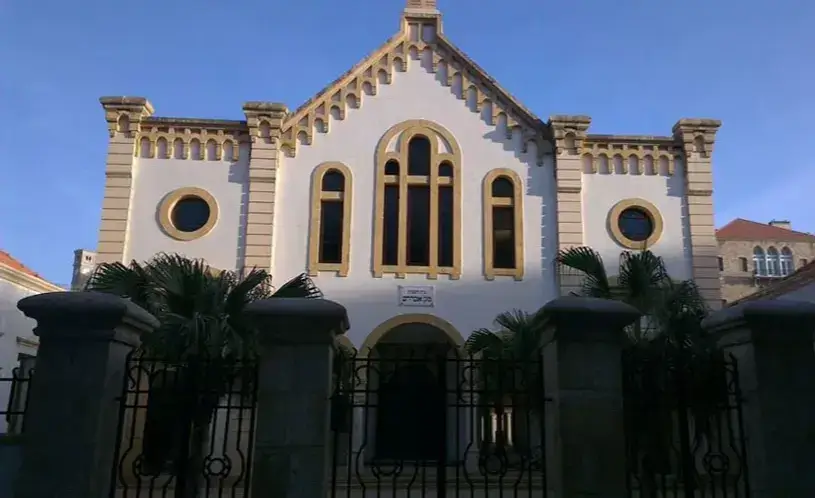Celebrating 100 years of Maghen Abraham!

Celebrating the centennial of Maghen Abraham Synagogue, a cornerstone of Lebanese Jewish heritage since 1925.
Hommenage to Joseph Tarrab
Tribute to Joseph Tarrab
Joseph Tarrab était un critique d'art libanais reconnu, journaliste, auteur et acteur culturel, profondément attaché à son pays et à la promotion de l'art libanais, jusqu'à son décès en 2025 à Beyrouth.
Joseph Tarrab was a renowned Lebanese art critic, journalist, author, and cultural figure deeply committed to his country and the promotion of Lebanese art until his death in 2025 in Beirut.
Biographie et parcours
Joseph Tarrab est né à Beyrouth en 1943 au sein de la communauté juive libanaise. Contrairement à la majorité des juifs libanais émigrés pendant la guerre du Liban (1975-1990), il a choisi de rester au Liban, suivant l'exemple de son grand-père, un rabbin beyrouthin. Il a étudié à l'Université Saint-Joseph de Beyrouth et à Paris, où il a travaillé sous la direction du démographe Alfred Sauvy.
Carrière artistique et culturelle
Joseph Tarrab a mené une carrière multifacette : il fut d'abord critique de cinéma, puis critique d'art pendant plus de 30 ans pour le journal L'Orient-Le Jour. Il a également exercé comme professeur universitaire et a été très impliqué dans le théâtre libanais des années 1960, jouant dans plusieurs pièces majeures.
En 2009, il cofonde la galerie d'art Maqam à Beyrouth avec Saleh Barakat. Cette galerie vise à valoriser et restaurer l'histoire picturale libanaise, souvent négligée depuis la guerre. Elle s'emploie à redonner une place aux artistes libanais depuis le XIXe siècle, en opposition à la focalisation contemporaine excessive sur l'art conceptuel post-guerre.
Contributions éditoriales
Tarrab est aussi l'auteur de plusieurs ouvrages consacrés à des artistes libanais, comme le sculpteur Hussein Madi, le peintre Jamil Molaeb, et le plasticien Mohammed Al-Haffar. Cette activité d'écrivain souligne son rôle dans la préservation et la diffusion de la mémoire artistique libanaise.
Engagement personnel et héritage
Il était fier de se présenter comme un « Juif arabe », affirmant son identité multiple et refusant toute stigmatisation liée au contexte régional. Il a toujours refusé de quitter le Liban, affirmant son attachement au pays, même lorsque sa famille et nombre de membres de la communauté libanaise juive émigraient.
Joseph Tarrab est décédé le 1er janvier 2025 à Beyrouth. Il a légué une importante collection d'ouvrages à l'université Saint-Esprit de Kaslik et à la Bibliothèque nationale libanaise, renforçant ainsi son héritage culturel.
Hommages et reconnaissance
Son influence dans le monde de la critique d'art et de la culture libanaise est largement reconnue. Il a reçu la distinction d'Officier de l'Ordre des Arts et des Lettres pour son rôle majeur dans la promotion artistique du Liban. Sa mort a suscité un hommage national, soulignant la perte d'un homme au large éventail de talents intellectuels et artistiques, toujours discret mais passionné par la culture libanaise.
Joseph Tarrab demeure une figure emblématique de la résistance culturelle libanaise, un pont entre les communautés et une référence incontournable pour la critique d'art et l'histoire artistique du pays.
Biography and Background
Joseph Tarrab was born in Beirut in 1943 within the Lebanese Jewish community. Unlike the majority of Lebanese Jews who emigrated during the Lebanese war (1975-1990), he chose to remain in Lebanon, following the example of his grandfather, a Beirut rabbi. He studied at Saint Joseph University in Beirut and in Paris, where he worked under the direction of demographer Alfred Sauvy.
Artistic and Cultural Career
Joseph Tarrab led a multifaceted career: he was first a film critic, then an art critic for over 30 years for the newspaper L'Orient-Le Jour. He also worked as a university professor and was heavily involved in Lebanese theater during the 1960s, acting in several major productions.
In 2009, he co-founded the Maqam art gallery in Beirut with Saleh Barakat. This gallery aims to enhance and restore Lebanese pictorial history, often neglected since the war. It works to give Lebanese artists since the 19th century a place, in opposition to the excessive contemporary focus on post-war conceptual art.
Editorial Contributions
Tarrab is also the author of several works devoted to Lebanese artists, such as sculptor Hussein Madi, painter Jamil Molaeb, and visual artist Mohammed Al-Haffar. This writing activity underscores his role in preserving and disseminating Lebanese artistic memory.
Personal Commitment and Legacy
He was proud to present himself as an "Arab Jew," affirming his multiple identity and refusing any stigmatization related to the regional context. He always refused to leave Lebanon, asserting his attachment to the country, even when his family and many members of the Lebanese Jewish community were emigrating.
Joseph Tarrab passed away on January 1, 2025, in Beirut. He bequeathed an important collection of works to the Holy Spirit University of Kaslik and the Lebanese National Library, thereby strengthening his cultural legacy.
Tributes and Recognition
His influence in the world of art criticism and Lebanese culture is widely recognized. He received the distinction of Officer of the Order of Arts and Letters for his major role in the artistic promotion of Lebanon. His death prompted a national tribute, highlighting the loss of a man with a wide range of intellectual and artistic talents, always discreet but passionate about Lebanese culture.
Joseph Tarrab remains an emblematic figure of Lebanese cultural resistance, a bridge between communities, and an essential reference for art criticism and the artistic history of the country.